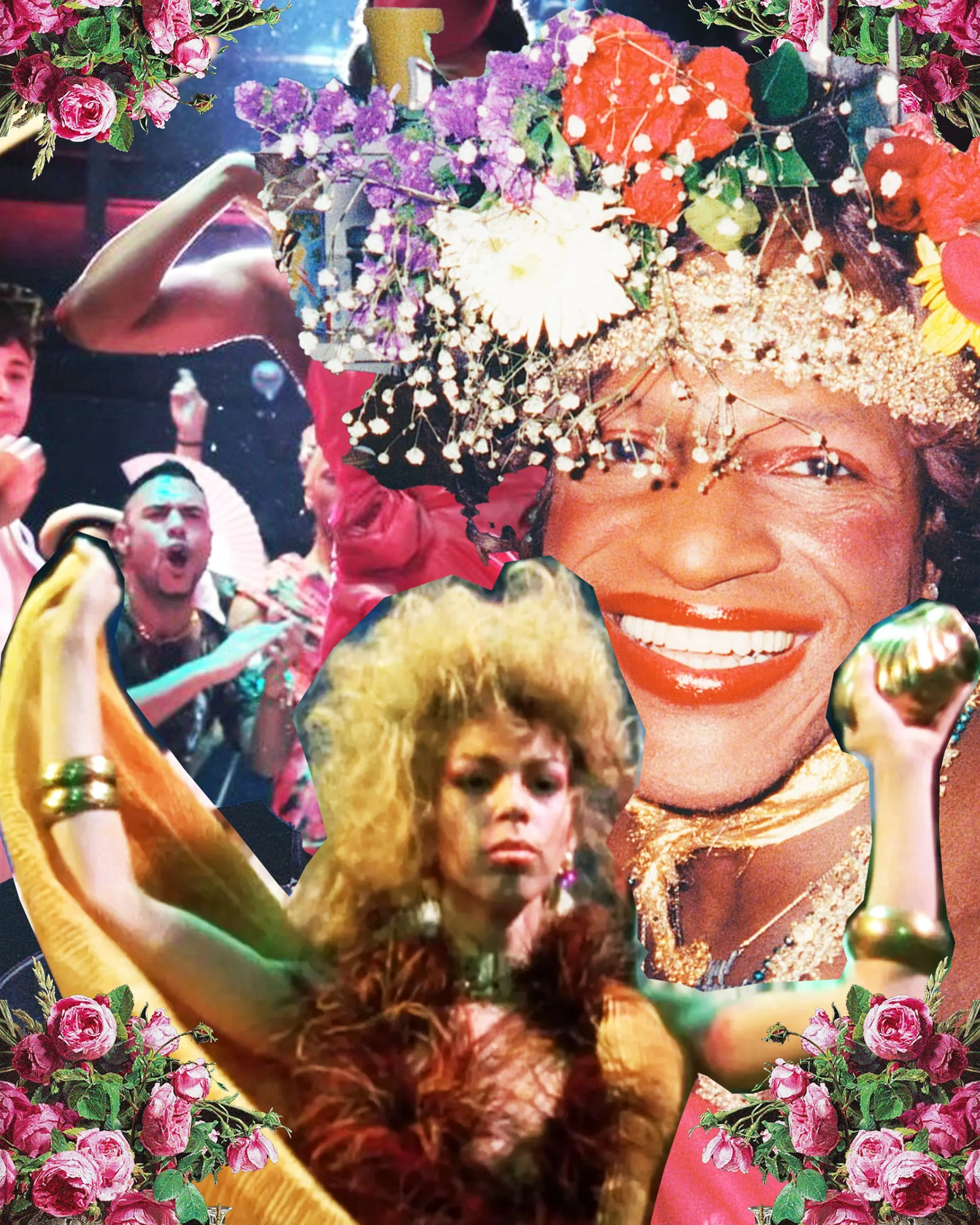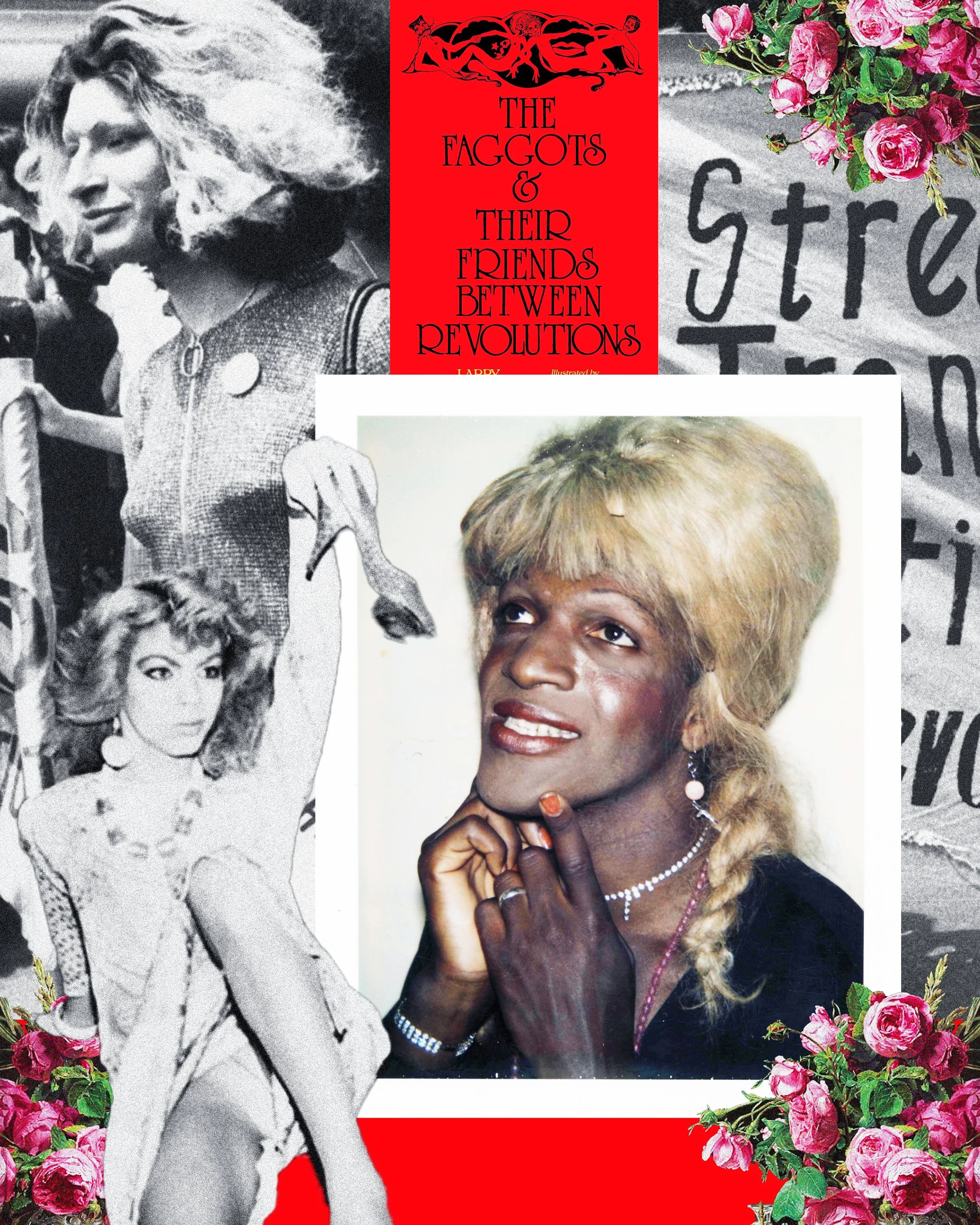Culture Slut: Trans Pride, Venus Xtravaganza and Marsha P. Johnson
Words: Misha MN
Another summer of Prides is coming to a close, and it’s time we really started to evaluate what is working for us and what isn’t. Earlier this year I exhorted you all to take the counter-cultural cry of BE GAY DO CRIME to heart, to examine the function of Pride and its place as Protest, rather than Party.
I definitely went into this season with more intention than previously, and ultimately felt all the better for it. Trans Pride marches, protests, fundraising parties, free parties, celebration of community, uplifting trans artists and clubnights – it all serves our dream of Queer Liberation, not Assimilation. Now, in the face of increasingly conservative and right wing governments, even from politicians who claimed to be our allies, it is important that we do not lose ourselves to the general malaise of a difficult existence. We need to act with intention in all that we do, and it's important that the media we consume reflects that.
Every year, as the parties and events approach, there is a documentary that I always revisit, just to contextualise the days of excess and revelry I am about to undergo, if only to ground myself in the political history of our hedonism. The Death and Life of Marsha P. Johnson is an incredible 2017 documentary by David France about the New York icon who did so much for the trans and queer communities, building to the cataclysmic Stonewall Riots. France follows activist Victoria Cruz, a trans contemporary of Marsha’s, as she reopens the investigation into Marsha’s death in 1992, going over the shady dealings of New York’s underground mafia, corrupt police, and countless other obstacles, all whilst recounting the powerful impact Marsha had as a cultural organiser. Cruz is a compelling narrator, working with charities and domestic abuse organisations to find justice for people who normally are tossed aside by uncaring institutions.
Marsha’s resume is impressive, culturally recognised as the instigator of the infamous Stonewall Riots, amongst other things. Whether or not she truly threw the first brick as the police raided the bar is hotly debated (a claim denied by her in the documentary), she was absolutely a key figure in those nights of societal change and violence. She was a member of the Gay Liberation Front, and a co-founder of Street Transvestite Action Revolutionaries (STAR) alongside Sylvia Rivera. She took part in the first Gay Pride march, then known as Christopher Street Liberation Day, and many years later became a prominent member of ACT UP during the AIDS crisis in the 1980s. Her body was found floating in the Hudson river just off the piers, which has since become a place of pilgrimage and reverence for queers seeking her spirit in the face of ongoing struggles. Cruz’s investigation did not make the kind of quantifiable change it was looking for, but it granted us a closer insight into Marsha’s life and for that we can only be grateful.
Sylvia Rivera’s appearance in the Marsha documentary also makes for extremely impactful viewing. Whereas Marsha is painted as the light side, the cheerful street queen with a giant smile, Sylvia is the harsh, loud, angry disruptor, furious at terrible things being done to the trans community by blase bourgeois gay men. In one powerful scene, Sylvia screams into a microphone during an early Gay Pride about the trans community being left behind by “respectable queers”, about being sacrificed in the name of assimilation. She chastises the crowd for leaving behind their gay brothers and sisters in prisons, for not caring about the trans women on the front lines. “I have been beaten, I have had my nose broken, I have been thrown in jail, I have lost my job, I have lost my apartment for Gay Liberation, and you all treat me this way?” The crowd boos and it is chilling. She screams for Gay Power, for people to care about the margins between genders, to fight for more than just the gay white middle class. Her cries echo through the decades and sound as fresh to our ears now as we face off against TERFs and LGB separatists as they must have then. Some things never change.
This year also saw the release of another great documentary about a trans icon; Kimberley Reed’s I’m Your Venus, a deeper look into the life of Venus Xtravaganza. Venus came into the public consciousness as one of the stars in seminal queer documentary Paris is Burning, a look at the New York Vogue scene in the 1980s and 90s by Jennie Livingstone, and while she died before the film could be released, her memory endures as one of the defining images of cunty stunty glamour. “Touch this skin honey, touch all of this skin. You just can’t take it, you’re just an overgrown orangutan!” Her vocabulary, her creative articulation, her very cadence can be heard today in RuPaul’s Drag Race, in drag culture, even in wider pop culture itself. She is the voice of trans womanhood.
“The film is heartwarming in its depiction of growth and acceptance of love and family, even if, like with Marsha, the circumstances of her death can’t be definitively answered.”
I’m Your Venus takes a similar approach to The Death and Life of Marsha P. Johnson, following an investigation into the death of its subject, taking a closer look at the circumstances and trying to find closure for the audience, and, in this case, Venus’ family. The narrators of this documentary are Venus’ brothers – big, butch, almost scary New Jersey macho guys who have come to love and honour the memory of their departed sister. Their total difference to the public perception of Venus is interesting and makes for a unique kind of tension throughout their reminiscences of their family life together. One brother recounts a story where he saw Venus in a skirt for the first time and he leapt out of a moving car and chased her down the street until she managed to get away by jumping the barrier and getting on a train to the city, which to any young cross dresser sounds terrifying – but the brother remembers it with fondness.
This tension is brought to a head when the brothers start reaching out to the House of Xtravaganza and meeting people who had known Venus. Jose Xtravaganza agrees to meet them and is clearly very emotional as he takes them to task about their treatment of Venus growing up. At first they seem defensive, but as the documentary progresses they come to terms with what they have done and how they could be better. They get a posthumous name change and are able to update Venus’s legal certificates and gravestone to reflect her real name and gender, and get the apartment she shared with her grandmother listed as a national landmark. The film is heartwarming in its depiction of growth and acceptance of love and family, even if, like with Marsha, the circumstances of her death can’t be definitively answered.
The documentary finishes with a celebration in the street Venus lived in, speeches from members of the House of Xtravaganza, the brothers, trans icon Domonique Jackson (who was also an executive producer alongside Jennie Livinstone), and many more. They all come together to remember, to cry and to dance. This is what Pride is. This is what it has always been.
It reminds me of The Faggots and Their Friends Between Revolutions, the 1977 queer manifesto fairytale written by Larry Mitchell, something I often revisit in times of hardship. It talks about the need to grieve collectively for what and who we have lost, and to fight like hell for what we are owed. It talks about how to survive in a world that does not want to work for us. It talks about how when we are met with scarcity, we must respond with abundance, and abundance of love, of friendship, of loyalty, of anger, of power. In a time when everything is being taken away from us, we must respond, like Marsha and Venus, with abundance.
I leave you with a quote that constantly lives with me from this book: “In the coming revolutions there are two things to remember: the first is that we will get our asses kicked. The second is that we will win.”


